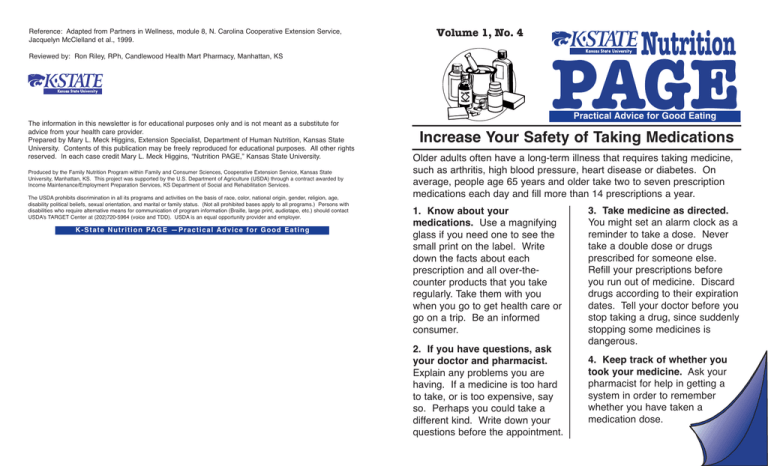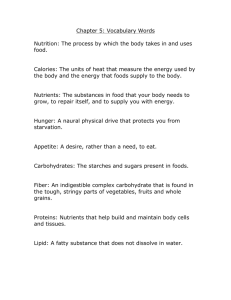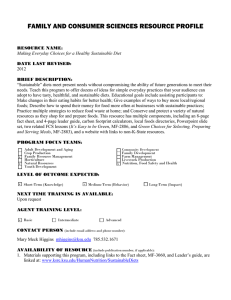
Reference: Adapted from Partners in Wellness, module 8, N. Carolina Cooperative Extension Service,
Jacquelyn McClelland et al., 1999.
Volume 1, No. 4
Reviewed by: Ron Riley, RPh, Candlewood Health Mart Pharmacy, Manhattan, KS
Practical Advice for Good Eating
The information in this newsletter is for educational purposes only and is not meant as a substitute for
advice from your health care provider.
Prepared by Mary L. Meck Higgins, Extension Specialist, Department of Human Nutrition, Kansas State
University. Contents of this publication may be freely reproduced for educational purposes. All other rights
reserved. In each case credit Mary L. Meck Higgins, “Nutrition PAGE,” Kansas State University.
Produced by the Family Nutrition Program within Family and Consumer Sciences, Cooperative Extension Service, Kansas State
University, Manhattan, KS. This project was supported by the U.S. Department of Agriculture (USDA) through a contract awarded by
Income Maintenance/Employment Preparation Services, KS Department of Social and Rehabilitation Services.
The USDA prohibits discrimination in all its programs and activities on the basis of race, color, national origin, gender, religion, age,
disability political beliefs, sexual orientation, and marital or family status. (Not all prohibited bases apply to all programs.) Persons with
disabilities who require alternative means for communication of program information (Braille, large print, audiotape, etc.) should contact
USDA’s TARGET Center at (202)720-5964 (voice and TDD). USDA is an equal opportunity provider and employer.
K - S t a t e N u t r i t i o n PA G E — P r a c t i c a l A d v i c e f o r G o o d E a t i n g
Increase Your Safety of Taking Medications
Older adults often have a long-term illness that requires taking medicine,
such as arthritis, high blood pressure, heart disease or diabetes. On
average, people age 65 years and older take two to seven prescription
medications each day and fill more than 14 prescriptions a year.
1. Know about your
medications. Use a magnifying
glass if you need one to see the
small print on the label. Write
down the facts about each
prescription and all over-thecounter products that you take
regularly. Take them with you
when you go to get health care or
go on a trip. Be an informed
consumer.
2. If you have questions, ask
your doctor and pharmacist.
Explain any problems you are
having. If a medicine is too hard
to take, or is too expensive, say
so. Perhaps you could take a
different kind. Write down your
questions before the appointment.
3. Take medicine as directed.
You might set an alarm clock as a
reminder to take a dose. Never
take a double dose or drugs
prescribed for someone else.
Refill your prescriptions before
you run out of medicine. Discard
drugs according to their expiration
dates. Tell your doctor before you
stop taking a drug, since suddenly
stopping some medicines is
dangerous.
4. Keep track of whether you
took your medicine. Ask your
pharmacist for help in getting a
system in order to remember
whether you have taken a
medication dose.
5. When you get a new
prescription, show the doctor
your list of medicines and overthe-counter products. If you are
seeing several doctors, they may
not be aware of other drugs you
are already taking.
Drug
side effects
can affect
nutritional
health
6. Take all over-the-counter
products by advice of your
doctor. Be careful when mixing
medications. Harmful interactions
can occur between drugs. Some
non-prescription products are
harmful if taken with other
medicine. Use of vitamins,
minerals, herbals, other
supplements, antacids, laxatives,
pain medicines, cold remedies and
other "pills, powders and potions"
can lead to serious problems.
Taking three or
more different
prescribed or over-the-counter
drugs a day can put one at
greater risk of poor nutritional
health. Older adults have two to
five times more drug side effects
than younger people do. In older
people, drugs sometimes take
longer to be absorbed and
broken down, stay in the tissues
longer and leave the bloodstream
at a slower rate. You may not
experience any side effect, or it
may disappear quickly. Some
side effects occur after you have
been taking the medicine for a
long time.
7. Use only one pharmacy, in
order to prevent harmful
medication interactions. Keep
your pharmacist aware of
everything you take.
8. Keep a record of your side
effects, and report them to your
doctor soon. Report if your
medicine seems to work
differently. Be honest about how
you take your medication and how
the medication affects you.
Examples of side effects might
include: depression, upset
stomach, dizziness, constipation,
diarrhea, weight loss, weight
gain, nausea, shortness of
breath, dry mouth, loss of
appetite, swelling, cramps, or
blood in the urine or stool.
Drugs can interact with foods,
alcohol, nutrients or caffeine.
This can make you lose nutrients,
become dizzy or unsteady, or
sick. Some medicines work more
quickly when you take them with
food or alcohol. Others work
more slowly, and other
medications do not work at all
with certain foods or with any
foods or alcohol. Some drugs
decrease your ability to absorb
nutrients. Some increase your
need for certain nutrients.
The following side effects may be
severe enough to interfere with
good nutrition.
• Being less hungry, which
can lead to too much weight
loss, frailty and disability. Eat
small meals, and high calorie
favorite foods often.
• Being hungrier, which can
lead to too much weight gain.
• Nausea, vomiting and
diarrhea, which can lead to
dehydration and loss of
nutrients. Avoid food odors
and liquids with meals. Eat
dry, bland foods slowly.
• Constipation, which can
lead to bowel conditions. Eat
high fiber foods.
• Dry mouth and changes in
taste sensation, which can
lead to eating less food. Add
sauce, gravy, soup, milk to
foods for moisture and flavor.
Drink liquids with meals.
• Indigestion or heartburn,
which can lead to eating
less food.
By eating a healthful diet, you
can protect yourself against
nutritional deficiencies caused by
the drugs you take. Talk with
your dietitian, doctor or
pharmacist about foods to eat to
replace any nutrients you may be
losing because of your
medications. Eat enough food,
even if your medicine takes away
your appetite. Eat foods that are
high in vitamins and minerals and
other nutrients, including whole
grains, fruits, vegetables, and
milk and protein foods. Avoid
foods that interact with your
medicine.


